An Analysis of Good Teacher Traits, Learning, and Cultural Impact
VerifiedAdded on 2023/01/18
|6
|1409
|54
Essay
AI Summary
This essay explores the essential traits of a good teacher, emphasizing honesty, commitment, and effective classroom management. It analyzes how students learn, highlighting the importance of understanding individual learning processes and the role of critical thinking. The essay also examines the influence of culture and identity on teaching and learning, discussing how cultural backgrounds can impact student performance and engagement, as well as the role of identity in the classroom environment. The analysis references several academic sources, including research on teacher professional development, learning communities, and the impact of culture on education. The essay concludes by underscoring the importance of teachers understanding their students' diverse backgrounds and creating inclusive learning environments. The essay is contributed by a student to be published on the website Desklib. Desklib is a platform which provides all the necessary AI based study tools for students.
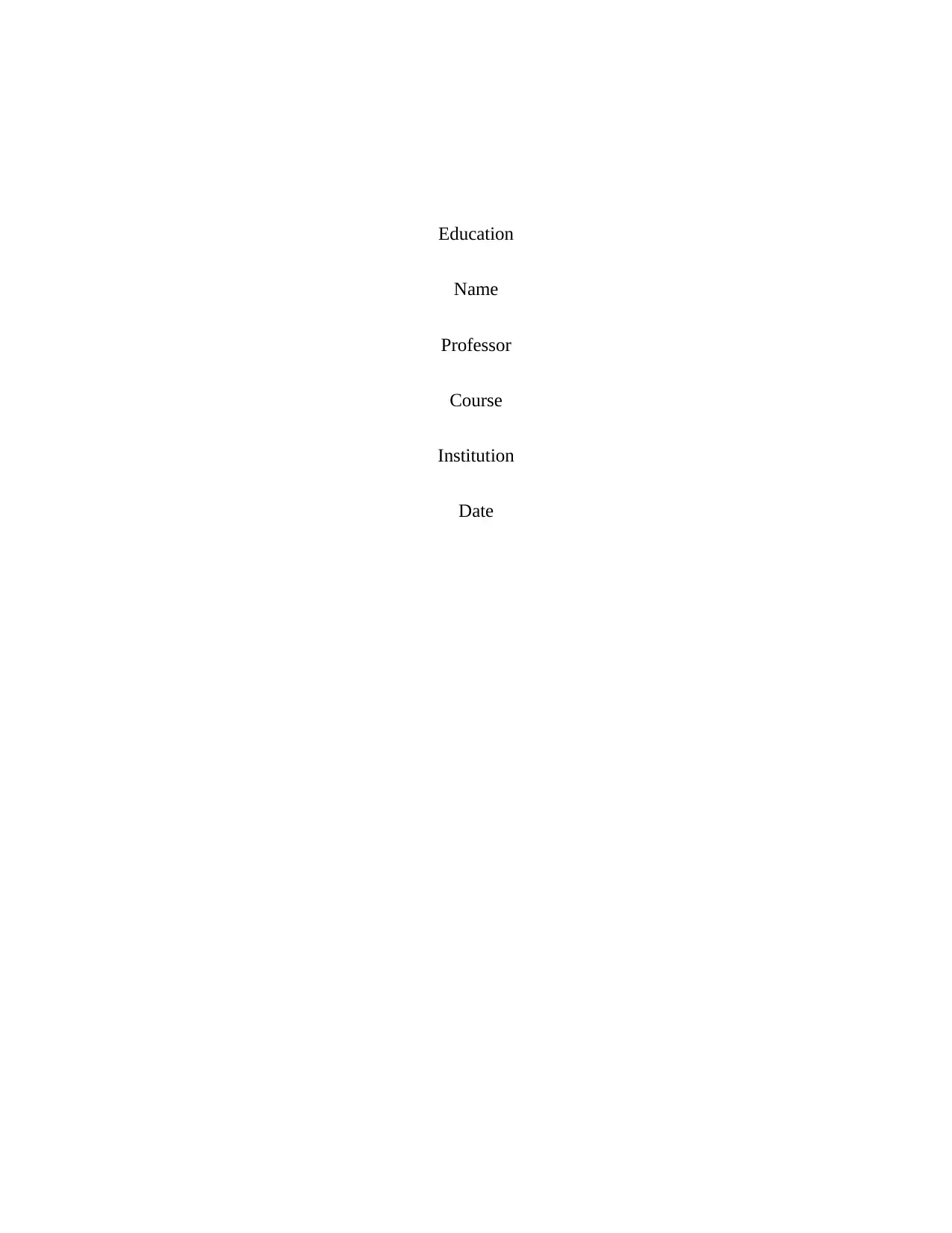
Education
Name
Professor
Course
Institution
Date
Name
Professor
Course
Institution
Date
Paraphrase This Document
Need a fresh take? Get an instant paraphrase of this document with our AI Paraphraser
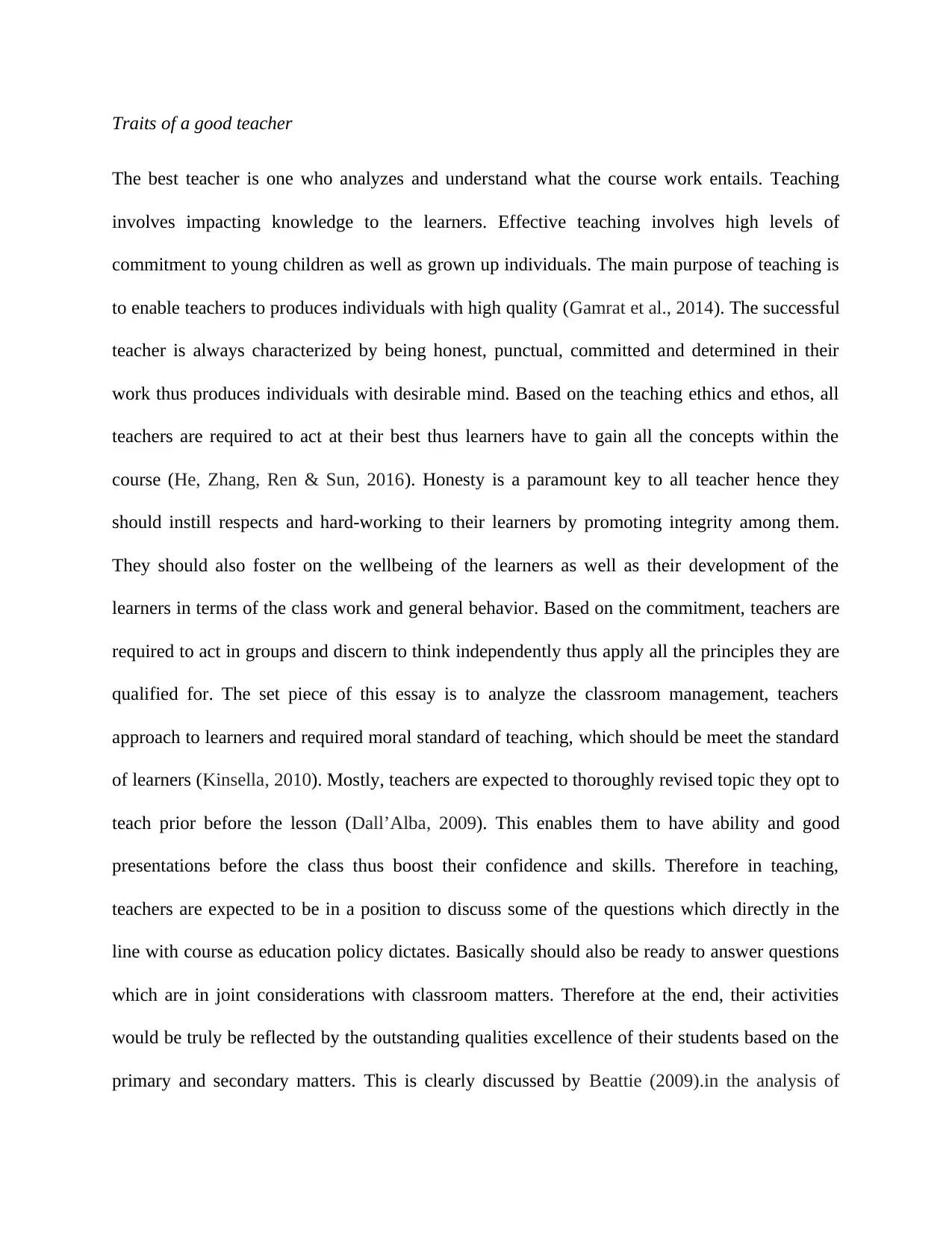
Traits of a good teacher
The best teacher is one who analyzes and understand what the course work entails. Teaching
involves impacting knowledge to the learners. Effective teaching involves high levels of
commitment to young children as well as grown up individuals. The main purpose of teaching is
to enable teachers to produces individuals with high quality (Gamrat et al., 2014). The successful
teacher is always characterized by being honest, punctual, committed and determined in their
work thus produces individuals with desirable mind. Based on the teaching ethics and ethos, all
teachers are required to act at their best thus learners have to gain all the concepts within the
course (He, Zhang, Ren & Sun, 2016). Honesty is a paramount key to all teacher hence they
should instill respects and hard-working to their learners by promoting integrity among them.
They should also foster on the wellbeing of the learners as well as their development of the
learners in terms of the class work and general behavior. Based on the commitment, teachers are
required to act in groups and discern to think independently thus apply all the principles they are
qualified for. The set piece of this essay is to analyze the classroom management, teachers
approach to learners and required moral standard of teaching, which should be meet the standard
of learners (Kinsella, 2010). Mostly, teachers are expected to thoroughly revised topic they opt to
teach prior before the lesson (Dall’Alba, 2009). This enables them to have ability and good
presentations before the class thus boost their confidence and skills. Therefore in teaching,
teachers are expected to be in a position to discuss some of the questions which directly in the
line with course as education policy dictates. Basically should also be ready to answer questions
which are in joint considerations with classroom matters. Therefore at the end, their activities
would be truly be reflected by the outstanding qualities excellence of their students based on the
primary and secondary matters. This is clearly discussed by Beattie (2009).in the analysis of
The best teacher is one who analyzes and understand what the course work entails. Teaching
involves impacting knowledge to the learners. Effective teaching involves high levels of
commitment to young children as well as grown up individuals. The main purpose of teaching is
to enable teachers to produces individuals with high quality (Gamrat et al., 2014). The successful
teacher is always characterized by being honest, punctual, committed and determined in their
work thus produces individuals with desirable mind. Based on the teaching ethics and ethos, all
teachers are required to act at their best thus learners have to gain all the concepts within the
course (He, Zhang, Ren & Sun, 2016). Honesty is a paramount key to all teacher hence they
should instill respects and hard-working to their learners by promoting integrity among them.
They should also foster on the wellbeing of the learners as well as their development of the
learners in terms of the class work and general behavior. Based on the commitment, teachers are
required to act in groups and discern to think independently thus apply all the principles they are
qualified for. The set piece of this essay is to analyze the classroom management, teachers
approach to learners and required moral standard of teaching, which should be meet the standard
of learners (Kinsella, 2010). Mostly, teachers are expected to thoroughly revised topic they opt to
teach prior before the lesson (Dall’Alba, 2009). This enables them to have ability and good
presentations before the class thus boost their confidence and skills. Therefore in teaching,
teachers are expected to be in a position to discuss some of the questions which directly in the
line with course as education policy dictates. Basically should also be ready to answer questions
which are in joint considerations with classroom matters. Therefore at the end, their activities
would be truly be reflected by the outstanding qualities excellence of their students based on the
primary and secondary matters. This is clearly discussed by Beattie (2009).in the analysis of
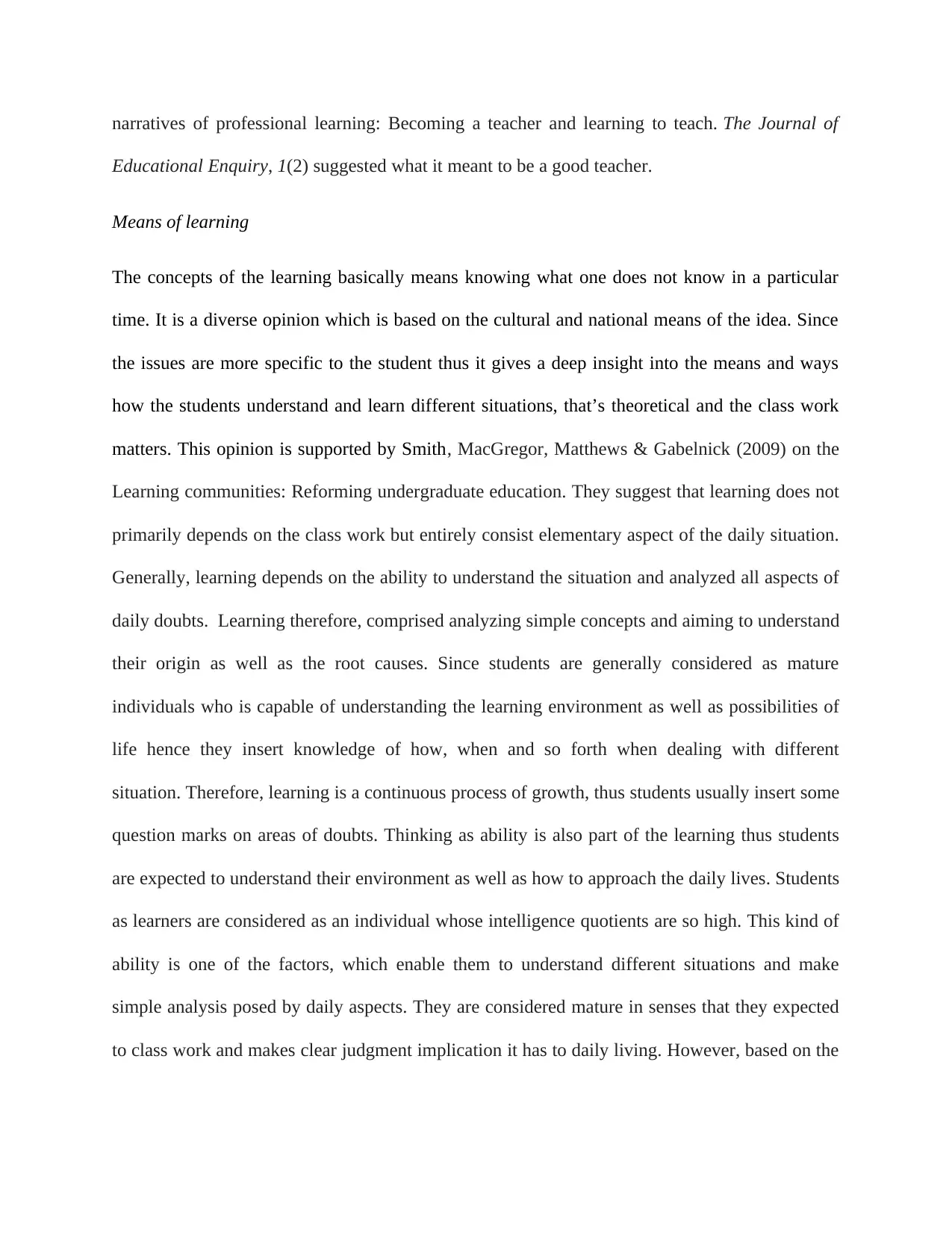
narratives of professional learning: Becoming a teacher and learning to teach. The Journal of
Educational Enquiry, 1(2) suggested what it meant to be a good teacher.
Means of learning
The concepts of the learning basically means knowing what one does not know in a particular
time. It is a diverse opinion which is based on the cultural and national means of the idea. Since
the issues are more specific to the student thus it gives a deep insight into the means and ways
how the students understand and learn different situations, that’s theoretical and the class work
matters. This opinion is supported by Smith, MacGregor, Matthews & Gabelnick (2009) on the
Learning communities: Reforming undergraduate education. They suggest that learning does not
primarily depends on the class work but entirely consist elementary aspect of the daily situation.
Generally, learning depends on the ability to understand the situation and analyzed all aspects of
daily doubts. Learning therefore, comprised analyzing simple concepts and aiming to understand
their origin as well as the root causes. Since students are generally considered as mature
individuals who is capable of understanding the learning environment as well as possibilities of
life hence they insert knowledge of how, when and so forth when dealing with different
situation. Therefore, learning is a continuous process of growth, thus students usually insert some
question marks on areas of doubts. Thinking as ability is also part of the learning thus students
are expected to understand their environment as well as how to approach the daily lives. Students
as learners are considered as an individual whose intelligence quotients are so high. This kind of
ability is one of the factors, which enable them to understand different situations and make
simple analysis posed by daily aspects. They are considered mature in senses that they expected
to class work and makes clear judgment implication it has to daily living. However, based on the
Educational Enquiry, 1(2) suggested what it meant to be a good teacher.
Means of learning
The concepts of the learning basically means knowing what one does not know in a particular
time. It is a diverse opinion which is based on the cultural and national means of the idea. Since
the issues are more specific to the student thus it gives a deep insight into the means and ways
how the students understand and learn different situations, that’s theoretical and the class work
matters. This opinion is supported by Smith, MacGregor, Matthews & Gabelnick (2009) on the
Learning communities: Reforming undergraduate education. They suggest that learning does not
primarily depends on the class work but entirely consist elementary aspect of the daily situation.
Generally, learning depends on the ability to understand the situation and analyzed all aspects of
daily doubts. Learning therefore, comprised analyzing simple concepts and aiming to understand
their origin as well as the root causes. Since students are generally considered as mature
individuals who is capable of understanding the learning environment as well as possibilities of
life hence they insert knowledge of how, when and so forth when dealing with different
situation. Therefore, learning is a continuous process of growth, thus students usually insert some
question marks on areas of doubts. Thinking as ability is also part of the learning thus students
are expected to understand their environment as well as how to approach the daily lives. Students
as learners are considered as an individual whose intelligence quotients are so high. This kind of
ability is one of the factors, which enable them to understand different situations and make
simple analysis posed by daily aspects. They are considered mature in senses that they expected
to class work and makes clear judgment implication it has to daily living. However, based on the
⊘ This is a preview!⊘
Do you want full access?
Subscribe today to unlock all pages.

Trusted by 1+ million students worldwide
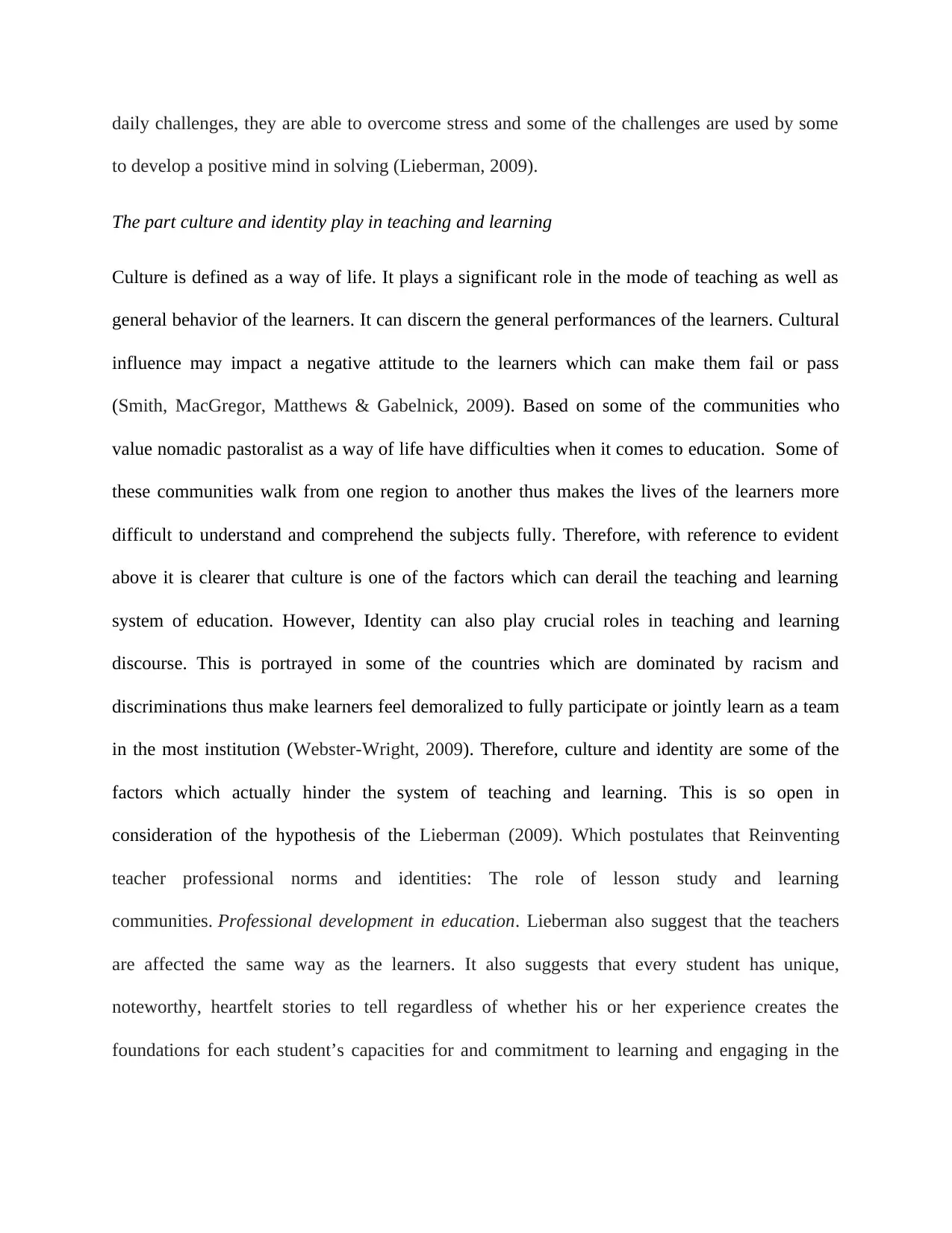
daily challenges, they are able to overcome stress and some of the challenges are used by some
to develop a positive mind in solving (Lieberman, 2009).
The part culture and identity play in teaching and learning
Culture is defined as a way of life. It plays a significant role in the mode of teaching as well as
general behavior of the learners. It can discern the general performances of the learners. Cultural
influence may impact a negative attitude to the learners which can make them fail or pass
(Smith, MacGregor, Matthews & Gabelnick, 2009). Based on some of the communities who
value nomadic pastoralist as a way of life have difficulties when it comes to education. Some of
these communities walk from one region to another thus makes the lives of the learners more
difficult to understand and comprehend the subjects fully. Therefore, with reference to evident
above it is clearer that culture is one of the factors which can derail the teaching and learning
system of education. However, Identity can also play crucial roles in teaching and learning
discourse. This is portrayed in some of the countries which are dominated by racism and
discriminations thus make learners feel demoralized to fully participate or jointly learn as a team
in the most institution (Webster-Wright, 2009). Therefore, culture and identity are some of the
factors which actually hinder the system of teaching and learning. This is so open in
consideration of the hypothesis of the Lieberman (2009). Which postulates that Reinventing
teacher professional norms and identities: The role of lesson study and learning
communities. Professional development in education. Lieberman also suggest that the teachers
are affected the same way as the learners. It also suggests that every student has unique,
noteworthy, heartfelt stories to tell regardless of whether his or her experience creates the
foundations for each student’s capacities for and commitment to learning and engaging in the
to develop a positive mind in solving (Lieberman, 2009).
The part culture and identity play in teaching and learning
Culture is defined as a way of life. It plays a significant role in the mode of teaching as well as
general behavior of the learners. It can discern the general performances of the learners. Cultural
influence may impact a negative attitude to the learners which can make them fail or pass
(Smith, MacGregor, Matthews & Gabelnick, 2009). Based on some of the communities who
value nomadic pastoralist as a way of life have difficulties when it comes to education. Some of
these communities walk from one region to another thus makes the lives of the learners more
difficult to understand and comprehend the subjects fully. Therefore, with reference to evident
above it is clearer that culture is one of the factors which can derail the teaching and learning
system of education. However, Identity can also play crucial roles in teaching and learning
discourse. This is portrayed in some of the countries which are dominated by racism and
discriminations thus make learners feel demoralized to fully participate or jointly learn as a team
in the most institution (Webster-Wright, 2009). Therefore, culture and identity are some of the
factors which actually hinder the system of teaching and learning. This is so open in
consideration of the hypothesis of the Lieberman (2009). Which postulates that Reinventing
teacher professional norms and identities: The role of lesson study and learning
communities. Professional development in education. Lieberman also suggest that the teachers
are affected the same way as the learners. It also suggests that every student has unique,
noteworthy, heartfelt stories to tell regardless of whether his or her experience creates the
foundations for each student’s capacities for and commitment to learning and engaging in the
Paraphrase This Document
Need a fresh take? Get an instant paraphrase of this document with our AI Paraphraser
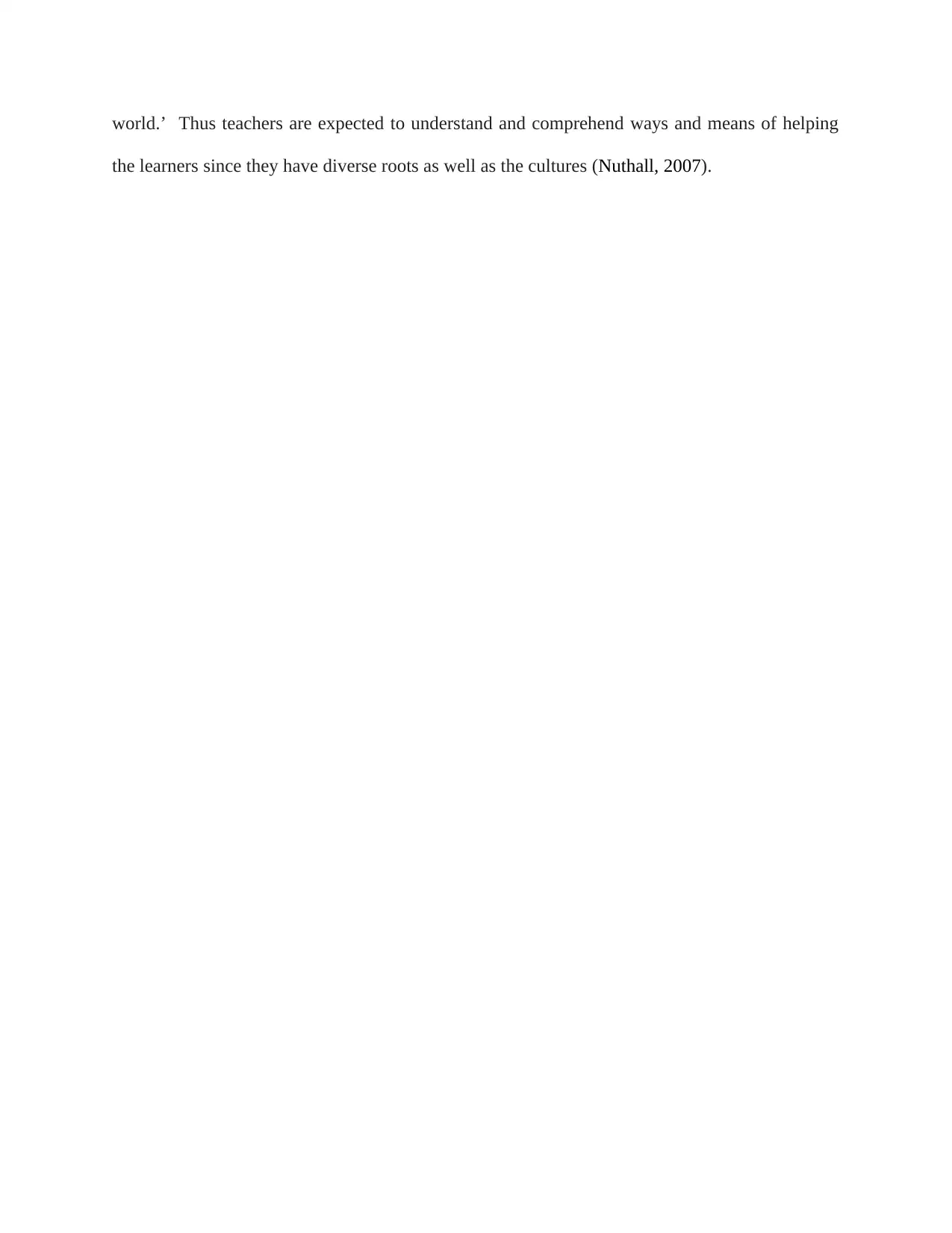
world.’ Thus teachers are expected to understand and comprehend ways and means of helping
the learners since they have diverse roots as well as the cultures (Nuthall, 2007).
the learners since they have diverse roots as well as the cultures (Nuthall, 2007).
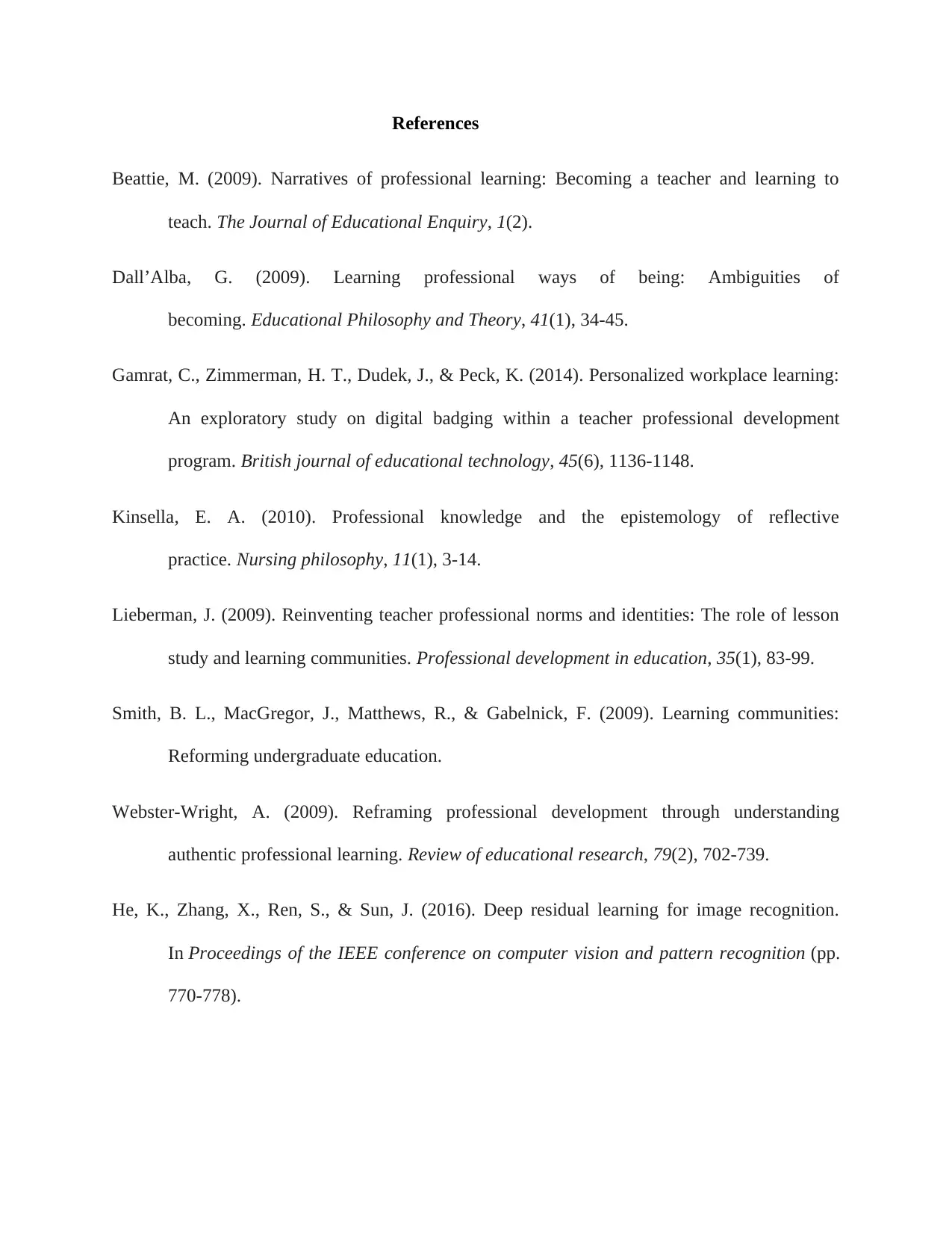
References
Beattie, M. (2009). Narratives of professional learning: Becoming a teacher and learning to
teach. The Journal of Educational Enquiry, 1(2).
Dall’Alba, G. (2009). Learning professional ways of being: Ambiguities of
becoming. Educational Philosophy and Theory, 41(1), 34-45.
Gamrat, C., Zimmerman, H. T., Dudek, J., & Peck, K. (2014). Personalized workplace learning:
An exploratory study on digital badging within a teacher professional development
program. British journal of educational technology, 45(6), 1136-1148.
Kinsella, E. A. (2010). Professional knowledge and the epistemology of reflective
practice. Nursing philosophy, 11(1), 3-14.
Lieberman, J. (2009). Reinventing teacher professional norms and identities: The role of lesson
study and learning communities. Professional development in education, 35(1), 83-99.
Smith, B. L., MacGregor, J., Matthews, R., & Gabelnick, F. (2009). Learning communities:
Reforming undergraduate education.
Webster-Wright, A. (2009). Reframing professional development through understanding
authentic professional learning. Review of educational research, 79(2), 702-739.
He, K., Zhang, X., Ren, S., & Sun, J. (2016). Deep residual learning for image recognition.
In Proceedings of the IEEE conference on computer vision and pattern recognition (pp.
770-778).
Beattie, M. (2009). Narratives of professional learning: Becoming a teacher and learning to
teach. The Journal of Educational Enquiry, 1(2).
Dall’Alba, G. (2009). Learning professional ways of being: Ambiguities of
becoming. Educational Philosophy and Theory, 41(1), 34-45.
Gamrat, C., Zimmerman, H. T., Dudek, J., & Peck, K. (2014). Personalized workplace learning:
An exploratory study on digital badging within a teacher professional development
program. British journal of educational technology, 45(6), 1136-1148.
Kinsella, E. A. (2010). Professional knowledge and the epistemology of reflective
practice. Nursing philosophy, 11(1), 3-14.
Lieberman, J. (2009). Reinventing teacher professional norms and identities: The role of lesson
study and learning communities. Professional development in education, 35(1), 83-99.
Smith, B. L., MacGregor, J., Matthews, R., & Gabelnick, F. (2009). Learning communities:
Reforming undergraduate education.
Webster-Wright, A. (2009). Reframing professional development through understanding
authentic professional learning. Review of educational research, 79(2), 702-739.
He, K., Zhang, X., Ren, S., & Sun, J. (2016). Deep residual learning for image recognition.
In Proceedings of the IEEE conference on computer vision and pattern recognition (pp.
770-778).
⊘ This is a preview!⊘
Do you want full access?
Subscribe today to unlock all pages.

Trusted by 1+ million students worldwide
1 out of 6
Related Documents
Your All-in-One AI-Powered Toolkit for Academic Success.
+13062052269
info@desklib.com
Available 24*7 on WhatsApp / Email
![[object Object]](/_next/static/media/star-bottom.7253800d.svg)
Unlock your academic potential
Copyright © 2020–2025 A2Z Services. All Rights Reserved. Developed and managed by ZUCOL.





